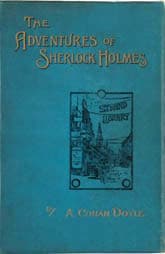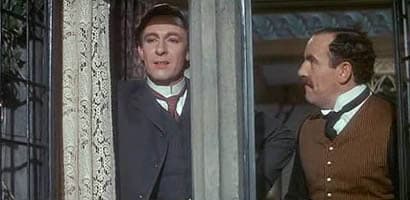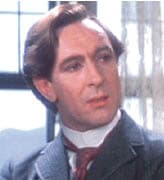The Adventures of Sherlock Holmes
Critique Text Sherlock Holmes at the movies
 First edition
First editionFirst publication
1892
Literature form
Story collection
Genres
Crime, mystery
Writing language
English
Author's country
England
Length
Twelve stories, approx. 94,000 words

Robert Stephens's Holmes peers through curtains, while Colin Blakely's randy Watson looks on.
Uncensored Sherlock
The Private Life of Sherlock Holmes (1970): Film, 125 minutes; director Billy Wilder; writers Wilder, I.A.L. Diamond; featuring Robert Stephens, Colin Blakely, Christopher Lee, Genevieve Page
Arthur Conan Doyle had been clear-eyed in describing his protagonist's shortcomings. He suffered ennui, he took serious drugs, he was poorly read and abysmally ignorant in fields unrelated to detection, he often treated people badly, and he was curiously disengaged from sexual interests.
But for most of his film life Sherlock Holmes's private demons were passed over. Often portrayals seemed to go out of their way to soften the man's characteristics. That's how movie heroes were treated.
But cinema had changed by the late 1960s and in the age of the anti-hero screenwriters could turn to Holmes's imperfections as grist for their dramas.
Sherlock as you've never seen him before
Billy Wilder's The Private Life of Sherlock Holmes was much anticipated by fans who perhaps expected a reboot of a Holmes franchise similar to the Rathbone-Bruce series. Peter O'Toole and Peter Sellers were rumoured to be sought as the leads. (Can you imagine?)
But what director Wilder delivered in 1970, based on his ten-years-in-the-writing script, was a very clever, sophisticated and somewhat risquι look at a Sherlock Holmes the public had never seen before.
Fifty years after Watson's death, a trunk is opened in a bank vault to reveal the Holmes stories whose sensitive nature had kept Watson from publishing them. Four of these stories were to follow in Wilder's original Sherlock symphony that ran three to four hours as filmed. However, the great director ended up cutting out half the episodes to present theatres with a more palatable two-hour film.
Even so, it works. They may not have been the first choices, but Robert Stephens and Colin Blakely are wonderful as Holmes and Watson—that is, as the uncensored Holmes and Watson depicted in this film. Holmes's drug use is open, Watson's womanizing is gloried in, and the seemingly infallible detective actually screws up occasionally.
Moreover, they're just more human—regular guys of their time, albeit with unique talents (in some ways, precursors to the 2009 Downey-Law concoction.)
Christopher Lee is almost unrecognizable as Sherlock's older—and smarter—brother Mycroft. Lee's really left his Dracula days behind now, sporting a bald pate, a pencil-thin mustache, a brisk working manner and a light touch of sardonic humour, as Mycroft works behind the scenes for the British empire while his better publicized sibling blunders about, turning up state secrets and apparent murder.
The tone of The Private Life of Sherlock Holmes is both tongue-in-cheek and serious, as Wilder films can be. The script has fun with Holmes chiding Watson for presenting him in his published stories as being taller than he is, playing violin better than he does, and wearing the ridiculous deerstalker outfit that the public now expects him to be seen in around London.
It's not quite Doyle's conception, even warts and all. And yet one is left feeling this is one of the more interesting instalments in Holmes's cinematic history.
Too bad we'll never see the original longer version, though some DVDs do include clips and script pages of the cut sections as extras, providing an extended look into Sherlock Holmes's private life.
The public has a right to know!
— Eric
Critique Quotes Text Sherlock Holmes at the movies
1922, 19291933, 19311937, 19391946, 19541955, 19591984, 19621992, 1965, 1970, 19751988, 1976, 1979, 1982, 19841994, 20002002, 2002, 2002b, 20092011, 20102017, 20122019, 2015


